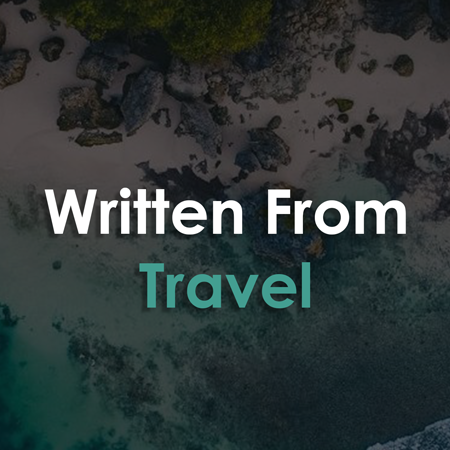Written From… Madrid, Spain
Written From Travel is talking to travel bloggers, writers and Written From Travel Contributors to get their opinions on travel, and divulge their personal tips for those looking to book a plane ticket. Today we want to introduce you to one of Written From Travel’s first contributors, the travel writer: Tyler Leung.

Travel advice
1. Your Written From Travel profile mentions that you’re involved in the literary and linguistics academic worlds. Does that feed into your travel experiences? If so, do you have any related travel advice for people that aren’t familiar with those fields?
It feeds into my travel experiences more than I thought it would. I honestly didn’t even expect the travel, literature, and language to merge at all (as obvious as that may seem to me now); to me, they were entirely separate interests. Only later did I realize that I was combining my interests when I noticed that my experience in one of these areas contributed to my understanding of another.
Literature can serve as a snapshot from the author’s perspective of their particular culture at that time. Like looking at a photograph. Literature is an artistic representation of a community’s philosophy, sociology, religion, history, etc.
It shows the reader what matters to the author, a member of that community. By piecing together various author’s perspectives, you can hopefully create something of a mental mosaic to give you a slightly better understanding of culture that you are visiting.
The same stands for language. In language acquisition, as you learn the popular phrases, you begin to get a better understanding of what that community is like. You begin to see what mindsets are valued, what is and isn’t acceptable behaviour and speech habits, and which topics are respected and which carry a taboo. As you dive into sociolinguistics, you learn how individuals bring their identities, shaped by their culture, into their language usage. The list goes on and on.
Looking at anything from multiple angles gives you a stronger understanding of what it is that you’re looking at. Literature and language are perfect avenues for gaining these new perspectives. These are, by no means, perfect ways understand a community, but it is important to recognize that there are countless aspects that contribute to a culture, not the least of which is the literature and language.
Both of these fields can be a little daunting at first, but I highly recommend picking any starting point and doing your best. Dive into the waters, so to speak, and learn how to swim. Learn what literature (if any) that the community you’re visiting has created and give it a try. Attempt to learn the language, or at least enough to get by.
No matter what, it will enrich your travel experience by giving you a means to communicate (however broken your speech may be). By taking the time to focus on these aspects of a community, you’ll create a better understanding and a deeper appreciation for the culture.
Travel media: National Geographic Traveller
2. You emphatically stated that National Geographic Traveller had it “all wrong” with the perpetuation of a certain ideal of travel, and its troubling consequences for the ‘every-day’. You addressed steps that people can take to apply the traveller’s mentality, if you will, in their every-day life. What steps can travel publications take to address the issue?
I guess this is the part where I admit that I am guilty of click-bait titles as I, too, am subscribed to Nat Geo Traveler and look forward to getting my mail every few months.
However, my beliefs still stand that a sort of misleading ideal is being inadvertently perpetuated, not only by this particular publication, but by most—if not all—platforms that glorify travel (perhaps “glorify” is the wrong word, but I sat here for far too long coming up with an alternative. Maybe it is the best word, then.
There certainly seems to be a severe lack of articles telling people to stay home and do what they always do, and for good reason since such a piece of advice is likely to be regarded as a joke.
The idea of merely existing at home, doing mental exercises to challenge what you think you know about your daily life is markedly less sexy and marketable than selling an experience like hiking to the top of Mount Fuji in the early morning hours to catch that gorgeous sunrise).
Traveling is wonderful and incredibly important in establishing that initial “traveler’s mentality”, but the lack of awareness for carrying that mindset with us when we return home is alarming. It leaves half of our lives entirely unexplored.
What can travel publications do to address this issue? Unfortunately, nothing. It doesn’t sell. It’s not sexy. It’s not adventurous. In fact, I’m incredibly thankful that my article was accepted by Written From Travel at all, since it goes so against the popular narrative.
What should travel publications do? Everything they can. Encourage readers to slow down and live their lives with their foot off the gas and their screens powered off. Get them to look up and out and around. One of the comments on the original article mentioned the idea of “new eyes”, and I think that that is the perfect visual for this idea.
If travel publications were more willing to publish articles that encourage maintaining the “traveler’s mindset” while at home, I think they could do a lot of good, not only for travelers to gain a stronger appreciation for cultures abroad, but for everyone to live with a new appreciation for the immediate world they live in.
Teaching English in China
3. You completed a TEFL contract in China. For readers considering this as a long-term travel option, what advice would you give them?
I guess I should start by saying that it is difficult. I don’t want to be responsible for anyone walking away with the false impression that it is just a walk in the park. It is difficult. And frustrating. By agreeing to teach English in a foreign country, you are agreeing to situate yourself, not only into their culture as a whole, but into the very specific subset that is their educational culture.
I found that, for my personal experience in China, my personal pedagogical practices and learning goals often clashed with powers that be. At the end of the day, however, I realized that I was a part of a larger system and, ultimately, I had to play my part, personal feelings aside. Of course, this varies country-to-country and, to a degree, school-to-school, so one experience you have in one particular location may vary wildly with that in another.
So my first piece of advice is to seriously consider if these challenges are something that you feel you can handle. You are immersing yourself in the culture in a way that is completely different to other forms of immersion.
However, as difficult as it can be, it can be incredibly rewarding. I say “can” because the potential is there, but requires serious effort from you. The energy that you put into the classroom and the effort that you bring will show. If you have a genuine love for teaching and for English, you need to bring that love to the classroom every day.
Most learners trying to acquire their L2 will be nervous and shy, afraid to make mistakes or embarrass themselves. You have to know how to help get them over that fear. You need to make your love for English contagious, and for that to be the case, it needs to be in abundance.
My favorite moments were when I saw a student grow to be confident and unafraid with their English usage, but that only comes with serious work from you. So that would be my second piece of advice: make sure that you love the language that you’re teaching. If you are considering TEFL merely as a means of travel, I can almost guarantee that you will wind up having a negative experience.
If you have already decided that TEFL is right for you, my final piece of advice is to soak up the opportunity. It seems obvious, but I feel that it is such an easy thing to overlook. As I said above, this is a completely different kind of immersion.It is unique.
Speak to your students, not only as a teacher, but as a traveler. There are plenty of people who can teach English, so bring your personal experiences, bring your culture, bring what gives those students a learning opportunity that they can’t get from a textbook.
This is a great opportunity to exchange culture and make new friends, but you have to go for it. While you’re there to teach, you can also be there to learn. Take in the experience. The most memorable experiences I had were the times when I went out after class to play games with the kids, or when I got drinks with the other teachers after we finished our lesson plans.
So my advice to all readers would be to seriously consider if this is the correct option for you. Don’t be afraid to be honest with yourself. There is nothing wrong with admitting that one specific fit isn’t right for you. Strongly consider if opportunity sounds right for you and, if it does, make sure that you bring a love of teaching and a hunger for culture and experience.
Travel on a budget
4. How do you organise and finance your travels around your full-time commitments?
Travel is expensive. That’s just the way it is. Sure, there are ways to make it less expensive. However, I think the reality is that travel is a luxury that, while I’ll always advocate for it, not everyone is privileged enough to enjoy.
Fret not, because the good news is that there are a lot of ways to make it more financially feasible. Because traveling is a luxury, the way that I afford it is to reduce or cut other luxuries in my life. My personal goal is to be able to maintain a quality of life that keeps me loving being at home while being able to put away money for my travels. So, my first step is always to create a list and a budget.
I make a list of everything that’s important for me when I travel. What luxuries do I want while I’m there and what luxuries do I want to bring with me? Then I cut or reduce anything that’s not completely necessary. Hostels are a much cheaper option (and, in my opinion, more exciting) than a hotel or B & B.
Traveling in the off season reduces prices and crowds. The biggest cost of traveling is the whole “getting there” part. In order to get more bang-for-my-buck, I stay longer (sometimes 3-4 weeks if I can afford the time off of work) and travel as much as I can while I’m there.
The list goes on, but the idea remains the same. If I don’t need the luxury, I reduce it. I’m a person who prefers to dive into something and, should I find I’m at a loss, improvise. In the process, I find out exactly what I don’t actually need.
My next step is to make a budget at home and figure out where I can make sacrifices. Like I said earlier, I don’t believe someone needs to cut everything out of their life and live on instant noodle packets in order to afford travel. Reduce first. Maintain your quality of life.
I drink coffee every day. At this point in my life, it has become something of a necessity, so I reduced the expensive mochas for cheaper cups of black coffee (and in the process became a coffee snob). I learned to cook at home. I figured out what I like to eat and bought groceries that are diverse and can be made into many different meals. I bought a bus pass to cut down on gas costs (this also gives me plenty of time to take care of business or read, activities which I recommend avoiding if you are the one behind the wheel).
I got library cards so that I could have free entertainment. The big one was looking at all the automatic monthly/yearly payments that I make to various websites. Amazon, Netflix, Hulu, Marvel Unlimited, etc. I figured out which produced the most utility for my dollar and I cut the rest. There are so many sneaky websites that you may not even remember signing up for. Cut it. There were so many free/cheap alternatives to what I considered necessary.
I realized that, after reducing so many costs, I was able to put away a lot more money and suddenly my travel goals became much more attainable. And as far as organizing, I’m probably not the one to ask. I get lost a lot and I love it.
Travel trends
5. What do you think is the future of travel?
This is a very difficult question to answer. “Future of travel” is a very challenging phrase to pin down with a succinct definition. I will say that I think, with the pervasiveness of technology—particularly Instagram—the idea of travel is being appreciated/glorified/popularized so much so that it seems appears to be becoming a defining factor for the rising generations.
Almost as if to say, “if you’re not traveling, or going on road trips, or living XYZ life, then you’re not really living the best life that you can”. While I agree with the sentiment that travel is incredibly rewarding and entertaining and can have countless benefits on one’s life, the narrative created by social media seems to be trying to unite the human experience under one roof, which I just can’t get on board with.
I think that what we’ll see, in regards to the future of travel, is a surge of travel and globalization (which I, subjectively, believe is good), but I think we’ll also see a rise of a sense of dissatisfaction from those who either can’t travel for whatever means, or from those that don’t enjoy travel. I think that this dissatisfaction will stem from a dissonance that they feel between their subjective experience and the experience that social media is trying to encourage.
That aside, I think what we’ll also see is a rise of interculturality. As technology pushes the boundaries of globalization even further, we’ll start to see more and more mixing of cultures and peoples into a unique sense of hybridity.
On the other hand, we may also see a reaction to that and start to see cultures strongly self-identify in order to preserve their own uniqueness. I won’t pretend to know what effect this will have on travel.
So, my succinct answer is: I don’t know. The world is changing far too fast with too many variables at work for me to guess what projection path it’s taking. Follow Tyler on Instagram, click here.






